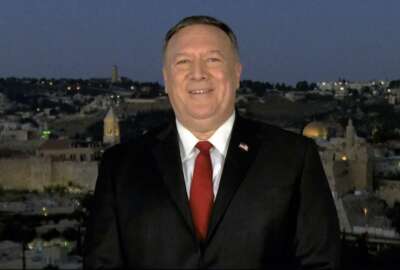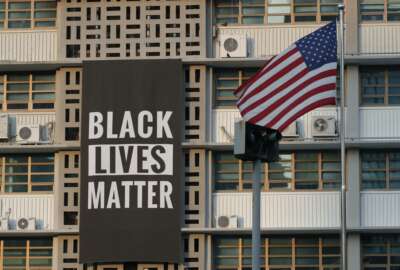

Federal employees can now technically show support for one of the presidential candidates at work, according to the Office of Special Counsel's post-Election Da...
A handful of battleground states are still counting ballots, but the end of Election Day serves as a marker of sorts for federal employees and the Hatch Act.
Even with this year’s uncertainty, the Office of Special Counsel is out with new, post-Election Day Hatch Act guidance for federal employees. The guidance includes plenty of exceptions and nuances, which may seem especially relevant in 2020.
Under the Hatch Act, civil servants generally can’t express support or opposition for a political party or candidate if they are on duty or at the federal workplace.
But the Hatch Act doesn’t prohibit federal employees from expressing support or opposition for a particular candidate after Election Day, like wearing a campaign T-shirt or displaying photos of a candidate while on duty at the physical or virtual workplace. Expressing support or opposition for one of the candidates while wearing an official agency uniform or using a government vehicle is also, generally, OK.
“For purposes of the Hatch Act, an individual is no longer considered a candidate when the outcome of the election is determined by vote of the Electoral College on the sixth day of January after the election,” OSC’s guidance, which the agency issued Wednesday, reads. “But while presidential candidates may retain their status as candidates well past Election Day, OSC has consistently advised that, with rare exception, post Election Day activities showing support for or opposition to a presidential candidate will not affect the result of the election for that office.”
Those “rare” exceptions, according to the OSC guidance, include “influencing or attempting to influence the results of the popular election, such as through a recount effort, and swaying or attempting to sway the allocation of electoral votes.”
As of Wednesday afternoon, election officials were still counting ballots in several swing states, and neither current President Donald Trump nor former Vice President Joe Biden had received enough electoral votes needed to win.
OSC goes on to explain that federal employees can’t use their positions or agency resources to affect the outcome of the election.
“Unlike wearing a campaign button or hat, engaging in certain post-Election Day activity on behalf of a political party, partisan political group, or candidate for partisan political office is still political activity because it has the potential to affect the outcome of the election,” OSC said. “Examples of such activity include taking part in legal challenges, a recount or other ballot-related efforts, or attempting to influence electors’ votes.”
But there are even further exceptions to this guidance. The Hatch Act delineates federal employees into two categories: “further restricted employees” and “less restricted employees.”
“Further restricted employees” include those who work for most intelligence community agencies, the Federal Election Commission or the Election Assistance Commission, OSC, Merit Systems Protection Board and certain components within the Treasury Department.
Career members of the Senior Executive Service, administrative law judges and administrative appeals judges are also considered “restricted employees” under the Hatch Act. Participating in one of the candidate’s legal challenges or recount efforts is off-limits for these employees.
But for most everyone else, federal workers can, in fact, participate in “partisan political management and campaigning” activities — as long as they’re not doing so on government time.
Even with this year’s complexities, the Hatch Act still prohibits federal employees from engaging in other kinds of political activity while on official duty.
“Unlike candidacies that, with rare exception, cease to exist after an election, political parties and partisan political groups do not similarly disappear,” OSC said. “Thus, activity directed at the success or failure of political parties or partisan political groups is prohibited by the Hatch Act even after Election Day.”
Federal employees could violate the Hatch Act in this case by, for example, forwarding emails to coworkers from a political party, wearing a T-shirt in support or opposition of a particular party or posting on social media about a political group while on duty, according to the guidance.
Congress hasn’t changed much about the Hatch Act since 1938, with a few exceptions. The Civil Service Reform Act set a new enforcement scheme for the Hatch Act with the creation of the MSPB and OSC, and a 2012 law later changed the penalties for federal employees.
“Ever since then it’s actually been loosened in favor of allowing federal employees more free speech, which is generally a good thing,” Debra D’Agostino, a partner with the Federal Practice Group, said of the original 1938 law.
She said it’s reasonably clear what the average career federal can and can’t do under the Hatch Act, even if the enforcement scheme doesn’t set explicit consequences for certain political appointees who violate the law.
The Hatch Act sparked rare national attention earlier this year, after government oversight groups accused Secretary of State Mike Pompeo and Acting Homeland Security Secretary Chad Wolf of violating the 81-year-old law during the Republican National Convention.
The accusations led White House Chief of Staff Mark Meadows to say “nobody cares” about the Hatch Act outside Washington, D.C. metropolitan area.
Federal employees, however, have expressed some frustration with what some have said is a double-standard when it comes to Hatch Act. OSC has the statutory authority to investigate potential violations of the Hatch Act, and punishments range from a warning letter to prosecution before the MSPB. OSC can — and often does — attempt to settle with the employee or negotiate an informal resolution.
It’s ultimately up to the president to enforce punishments for his appointees.
“The law is just not adequately addressing these situations, because I don’t think anyone foresaw that these situations would be going on,” D’Agostino said.
Copyright © 2024 Federal News Network. All rights reserved. This website is not intended for users located within the European Economic Area.
Nicole Ogrysko is a reporter for Federal News Network focusing on the federal workforce and federal pay and benefits.
Follow @nogryskoWFED



